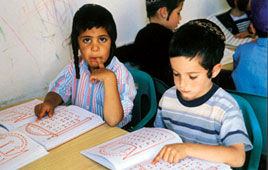
Israeli schools will reopen as planned on September 1st despite a spike in COVID-19 cases.
The coronavirus cabinet announced the decision after a long debate on Monday.
Ministers backed rolling out vaccines on campuses to children over 12, subject to parental approval. Parents will test children at home and declare they tested negative for the virus.
In ‘red’ communities with high infection rates students in grades eight to 12 will study remotely unless 70% of pupils are vaccinated or have recovered from COVID-19.
The Green Pass policy is in place for school staff who must present proof of vaccination or recovery, or provide a recent negative test before entering a school building.
According to the Education Ministry, 37,000 teachers have not been vaccinated.
Israel, meanwhile, has begun a national testing initiative to glean the number of unvaccinated children aged three to 12 who have developed immunity ahead of the school year.
The health and education ministries along with the IDF Home Front Command are behind the program aimed at 1.5 million youngsters. Children with sufficient antibodies will not have to quarantine when exposed to a COVID-19 patient. The aim is to limit school disruptions.
Defense Minister Benny Gantz backed 6,000 IDF reservists helping with testing.
In related news, Israel has begun its vaccine booster campaign. Over 1.4 million citizens have received a third inoculation just weeks after the initiative was launched for over 60s.
Professor Ran Balicer advises the cabinet and warned morbidity rates may rise, whilst the government will not rule out measures for the High Holy Days.
There are 670 patients hospitalised, 162 in critical condition including 108 patients on ventilators. To date, there have been 6,830 people fatalities from COVID-19.
Health Minister Nitzan Horowitz is pushing for a surge in first and second vaccinations in communities reticent to date. During a visit to the Arab town of Kafr Qasem near Tel Aviv, he noted, “I’m not going to give up on these weaker groups.”
Horowitz added that to avoid stricter restrictions or a nationwide lockdown more people must be vaccinated. The Tel Aviv suburbs of Kfar Shmryahu and Savyon are most vaccinated. The least vaccinated are Bedouin communities of Kseifa and Hura.
The Health Ministry’s Director-General Nachman Ash told Channel 13 News that Israel would “most probably” expand eligibility for a booster vaccine to include people aged 30 up.
“We can see the operation is going well,” he explained. “We’re vaccinating the older population, and we can take the age down. There are enough vaccines.”
According to Health Ministry figures 37.2 % of Israelis aged 50 to 59 have received a third vaccination. Over 60% of Israelis aged 60-69, 75.8% of 70-79s, 71.6 % 80-89s and 66.2 % of 90 plus citizens have also had a third shot.
As part of the initiative, mobile vaccination vans from the Health Ministry and Magen David Adom will join the initiative to vaccinate neighbourhoods and communities throughout Israel.
The coronavirus cabinet, meantime, have backed travel to Uman in the Ukraine for Rosh Hashanah. Regulations apply to Israeli travellers going to an “orange” country. Passengers must present a negative test within 72 hours before the flight.
After Rosh Hashanah, Israelis in Ukraine must submit a quarantine declaration 24 hours before returning to Israel. At Ben-Gurion Airport, travellers will take a test and enter quarantine for 14 days. This can be reduced to seven days with two negative coronavirus tests.
Fully vaccinated travellers must have Ukrainian medical insurance (over the age of 12) but are not required to be tested for COVID-19 or enter quarantine on arrival.
Unvaccinated travellers to Ukraine must quarantine for 10 days on arrival and register with a surveillance app until they receive a negative test, which can taken at Kiev airport









